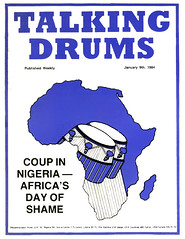Nigeria - The Humbling Of A Giant
When the news first broke, the suggestion was quite clear that Nigeria's new military rulers had made the payment, giving the impression that the new regime was not only action orientated but was moving with speed to tackle the country's debt problems.
The reality, unfortunately, was a little more mundane. The payment had been ordered on Thursday, December 29 and made to Barclays Bank International on Friday December 30 and when Barclays, which acts as agent for a group of creditor banks distributed the money on Tuesday, the date when it was formally due, it became headline news. This is a routine payment of interest due on the $1.9 billion in arrears on letters of credit which had never attracted any notice before.
It was being pointed out that the new regime in Nigeria could have countermanded the order if it had so wanted. Fears in financial circles were therefore said to have been calmed. Those who have experience of army takeovers were saying that the new regime was not even aware of the payment.
The crux of Nigeria's problems has been the slump in oil revenues, which provide 90 per cent of the country's export earnings.
Production has dropped from 2.4 million barrels a day in 1979 to 1.3 million barrels a day, the level to which Nigeria is restrained by Opec's production sharing quotas.
The price of Nigeria's oil has also fallen from nearly $40 to $30 a barrel, further dwindling revenue from oil from $22 billion in 1980 to under $10 billion last year.
With the fall in revenue, the country's debts increased and President Shagari's government introduced import restrictions in April 1982 and further tightened them at the beginning of 1983. However, by May 1983, trade debts had grown to $5 billion and Nigeria had to go to international banks to seek the rescheduling of $2 billion of these debts.
The government then started what were to become protracted negotiations with IMF, negotiations that have run into many sticking points because of Nigeria's resistance to the Fund's suggestion of devaluing the Naira.
Nigerian arguments against devaluation have centred on the fact that oil, which accounts for more than 90 per cent of the country's exports, is reckoned in U.S. dollars and devaluation of the Naira would only mean high prices inside the country and suffering for the people without any advantages.
The budget speech presented as the last major act of the Shagari administration made no mention of devaluation or any currency realignment as had been widely expected.
Financial sources are predicting that Nigeria's new military rulers would be tempted to take the country out of OPEC to be able to increase oil production and raise revenues in spite of Gen. Buhari's earlier assertion that Nigeria will stay in OPEC.
